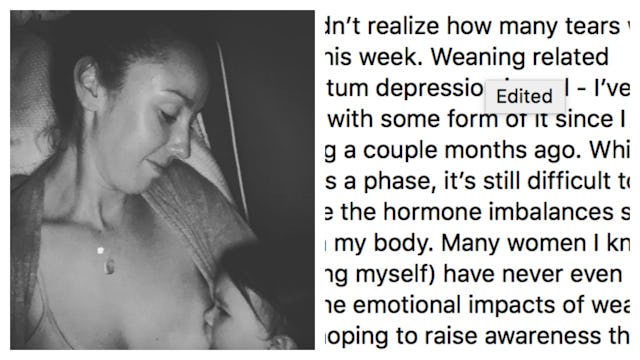Weaning-Related Depression Almost Broke Me

Fat tears streamed down my cheeks as I nursed my daughter, Savannah, for the very last time. At 14 months old, she treated this nursing session like every other time since she was born, taking what she needed and lazing back satisfactorily when she was finished. She had no clue, but I knew it would be our last time breastfeeding.
I’d been actively weaning for a few months, slowly cutting out one pump or nursing session at a time to avoid clogs and other complications I’d been prone to in the past. Though I’d expected this day to come for awhile, I’ll never forget this moment full of such pride and melancholy.
I expected those tears, but what I didn’t expect was the intense sadness and anxiety in the weeks that followed.
Exasperated and sad, I did some research and found that a weaning-related depression, a niche of postpartum depression, is common, though rarely talked about. I felt this “AHA!” moment when I figured out that my woes were related to a hormonal shift — one that a new mom has little control over and can bring down her whole world. Turns out, I had been experiencing these big surges in prolactin and oxytocin (a.k.a. “the love hormone”) for over a year every time Savannah nursed, and then one day, those surges suddenly stopped.
I don’t want to be overly dramatic — I experienced a bout of major depression in my early twenties and this experience was not remotely comparable — but here’s what I wish someone had shared with me before I weaned Savannah:
Weaning-related depression is a real condition, and a lot of moms have been through it before. You will get through it too.
I recently shared my experience with weaning-related depression via a photo on Instagram and was overwhelmed with the number of responses from family, friends, and acquaintances who shared similar stories of sadness tied to the end of a nursing relationship.
https://www.instagram.com/p/Bl6wAa0lxkZ/?taken-by=dani__graham
By sharing my story on social media, I learned that my own mother had the same feelings when she was forced to wean me as a newborn, and then after weaning each of my brothers. I read messages from friends who felt the same way as I did, but had never spoken to anyone about it before because they felt so alone in their struggles.
Most importantly, I learned that whether you wean by choice or are forced to wean due to other nursing complications, we can all feel similar pangs of sadness, guilt, and sometimes even depression related to stopping breastfeeding.
At six weeks post-weaning, I am feeling much more emotionally balanced and back to normal. I don’t regret a single second of choosing to nurse Savannah for over a year, even if we had some bumps in the road along the way. I am thankful everyday that we were able to overcome obstacles to have a successful nursing journey. And yes, I still plan to nurse my next child despite my bout with weaning-related depression, because I believe in the scientific benefits of breastfeeding for both mom and baby and the special bond that nursing creates.
Please know that if you’re feeling sad or anxious during or after weaning, you are not alone. If your feelings are getting worse, don’t be afraid to seek help from a professional, or at least make your feelings known. You might be surprised to find out how many other women are going through the same exact thing.
This article was originally published on